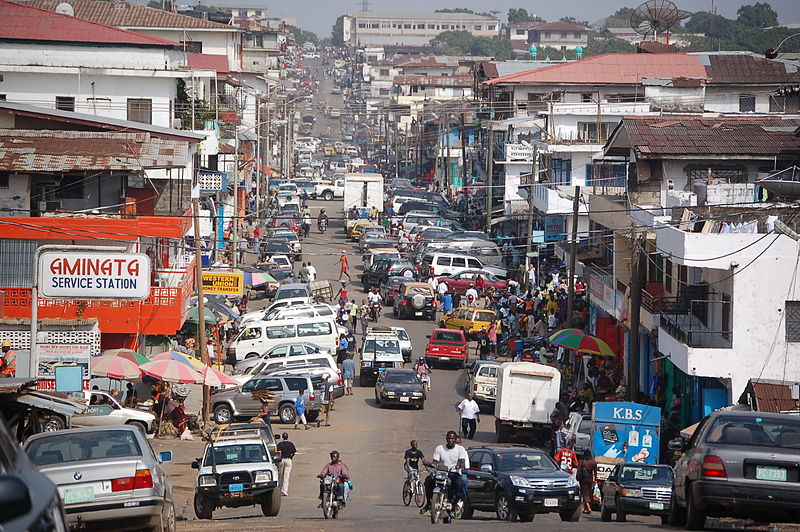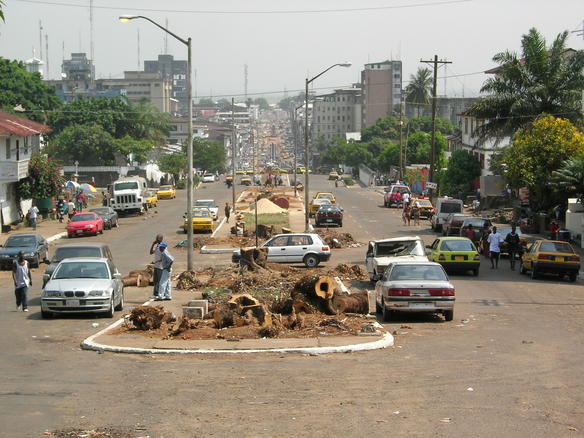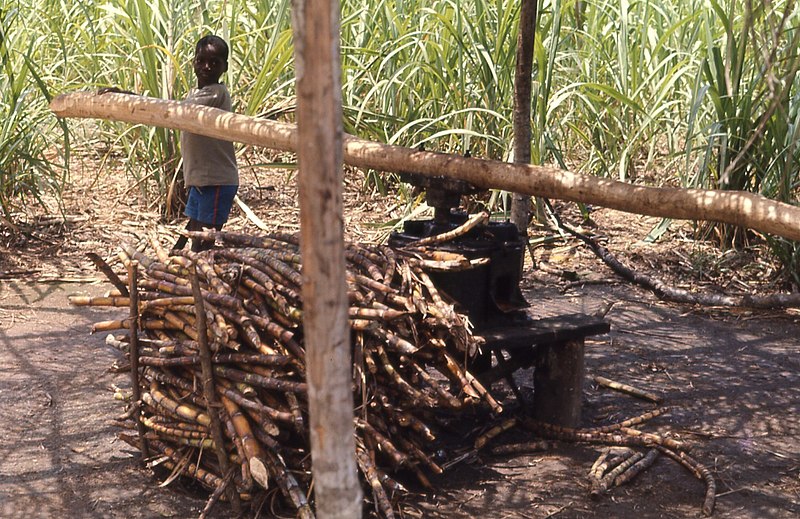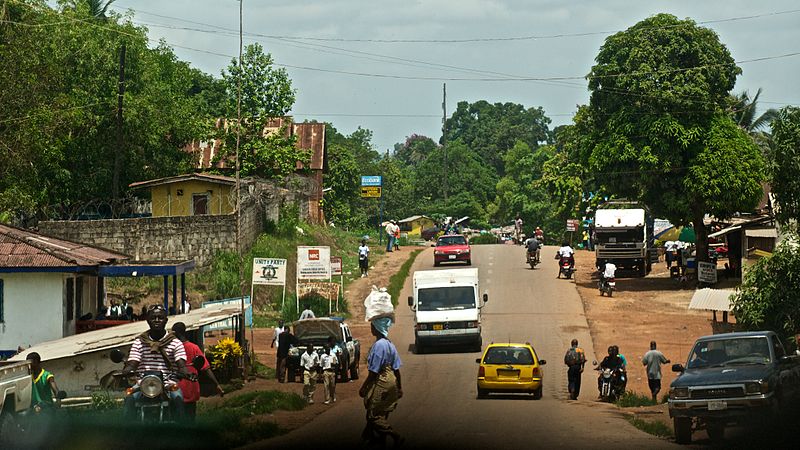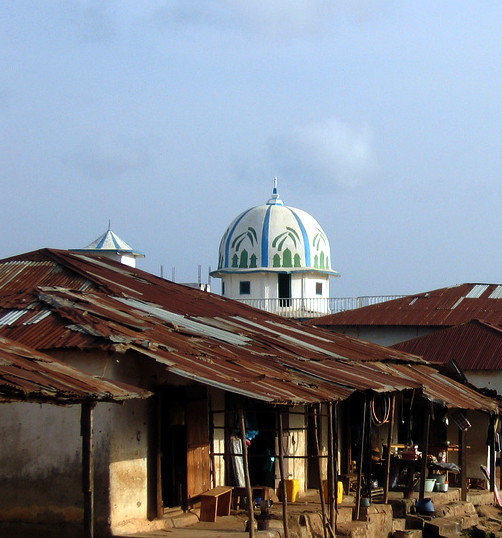Adopting from Liberia
Notice: As of July 14, 2014, all individuals and agencies facilitating international adoptions must be in compliance with the Intercountry Universal Accreditation Act.
Contents
Liberia Adoption Alert
Notice: Notice regarding fees charged for exit clearance (August 31, 2010)
The Department of State is aware of cases where adoptive parents have been asked to pay a fee for an exit clearance letter in Liberia. Americans should be extremely cautious about any requests for payments of fees associated with exit clearance letters. Liberia's Bureau of Immigration and Naturalization does not charge a fee for the exit clearance letter. Any requests for such fees should be immediately reported to the U.S. Embassy.
U.S. Embassy in Liberia
111 U.N. Drive Mamba Point Monrovia, Liberia Tel: +231-77-054-826 Fax: +231-77-010-370 Email: ConsularMonrovia@state.gov
The U.S. Government does not condone bribery or corruption of any kind.
Notice: Notice Concerning Adoption Processing In Liberia (April 26, 2010)
On January 26, 2009, the Government of Liberia suspended adoptions because of allegations of mismanagement and corruption in the adoption process. The U.S. Department of State cautions American citizens against filing an application to adopt a child from Liberia while the moratorium on adoption remains in effect. The U.S. Embassy remains in frequent contact with adoption officials, but there is no indication when the moratorium might be lifted.
Since the suspension went into effect, the Liberian Government has formed an Ad-hoc Central Adoption Authority to have oversight over adoptions and is working to pass adoption legislation focused on strengthening existing laws and preventing abuses of the system. The U.S. government strongly supports the Liberian Government's efforts to strengthen its adoption laws and regulations to provide greater transparency and safeguards for prospective adoptive children, their birth parent(s) and prospective adoptive parents.
The Government of Liberia has informed the U.S. Embassy that it will not process any adoption cases during the suspension, including those that were in progress before the suspension was announced, and that it will not permit adopted children depart Liberia. They have also indicated that no new adoption applications should be accepted by adoption service providers, no referrals of children to prospective adoptive parents made, and no adoption petitions filed with the Liberian court while the suspension is in effect. The Liberian Government has made no provisions for the grandfathering of cases under the existing laws. Therefore any case in which a full and final adoption had not been completed prior to January 26, 2009 is effectively on hold.
The U.S. Embassy in Monrovia has been informed by the Government of Liberia that it will issue exit clearances, on a case-by-case basis, to children whose full and final adoption had been completed prior to January 26, 2009 and approved by Liberia's Ad-hoc Central Adoption Authority. Prospective adoptive parents who believe their case might fall into this category should contact the Consular Section at adoptionsmonrovia@state.gov to discuss next steps in the visa process and any gaps in their adoption file. Additionally, the Government of Liberia is requiring that all adoptive parents appear personally for the exit clearance interview. Processing the visa and obtaining the exit clearance takes about a week of time, but adoptive parents are advised to purchase open-ended return tickets, as there is no guarantee as to how quickly the exit clearance can be obtained.
Prospective adoptive parents and adoption service providers are reminded that a consular officer is required, by law, to complete a For I-604 (determination of orphan status) before issuing a visa in all IR-3 and IR-4 adoption cases. In some cases, this may require only a conversation with the birth parent, but in others it may require a full field investigation, possibly lasting several weeks. Since verifying the parent-child relationships in Liberia is difficult, we also expect that in most cases where the child was relinquished by the birth parent, DNA testing will be recommended in order to establish a blood relationship between the adopted child and claimed birth parent(s).
Please continue to monitor adoption.state.gov for updated information.
Hague Convention Information
Liberia is not party to the Hague Convention on Protection of Children and Co-operation in Respect of Intercountry Adoption (Hague Adoption Convention). Therefore, when the Hague Adoption Convention entered into force for the United States on April 1, 2008, intercountry adoption processing for Liberia did not change.
Currently there is a moratorium on new adoptions and all approved adoptions must be approved by the ad-hoc adoption committee before the children may leave the country. Any prospective adoptive parent who is in the process of adopting from Liberia should contact the Consular Section of the U.S. Embassy in Liberia at the following e-mail address.
In July 2008, the Ministry of Justice and Ministry of Health and Social Welfare began carefully reviewing all adoption cases submitted to them for approval. This change occurred because the Government of Liberia noticed an increasing number of cases in which adoptive parents decided to terminate their parent/child relationship with Liberian adoptive children. The Liberian Parliament is considering a revised adoption law, which was proposed in November 2007. If enacted, the new law would provide additional safeguards to protect adoptive children, birth parents, and prospective adoptive parents.
Who Can Adopt
To bring an adopted child to United States from Liberia, you must be found eligible to adopt by the U.S. Government. The U.S. Government agency responsible for making this determination is the Department of Homeland Security, U.S. Citizenship and Immigration Services (USCIS). Learn more.
In addition to these U.S. requirements for prospective adoptive parents, Liberia also has the following eligibility requirements for prospective adoptive parents:
Residency
There are no residency requirements for intercountry adoptions in Liberia.
Age of Adopting Parents
There are no age requirements for intercountry adoptions in Liberia.
Marriage
There are no marriage requirements for intercountry adoptions in Liberia. If you are married, both parents must adopt the child.
Income
There are no income requirements for Liberian intercountry adoptions.
Other
N/A
Who Can Be Adopted
Liberia has specific requirements that a child must meet in order to be eligible for adoption. You cannot adopt a child in Liberia unless he or she meets the requirements outlined below.
The Consular Section of the U.S. Embassy thoroughly investigates each adoption case to verify that the child's orphan status is legitimate. Since these investigations can take a considerable amount of time, prospective adoptive parents should check with the Embassy to ensure that the investigation has been completed before making travel arrangements for the child to depart Liberia.
In addition to these requirements, a child must meet the definition of an orphan under U.S. law for you to bring him or her home back to the United States. Learn more about these U.S. requirements.
ELIGIBILITY REQUIREMENTS:
Relinquishment Requirements: In addition to a statement of relinquishment from the biological parents, the Liberian Government also requires an approved case summary from the Ministry of Health and Social Welfare (MHSW). The case summary is issued after a social worker has investigated the case thoroughly and concluded that adoption is in the best interest of the child and the Minister or one of his deputies has reviewed all the legal paperwork necessary to process an adoption in Liberia.
Abandonment Requirements: If the child was born in wedlock, the consent of both parents is required. If the child was born out of wedlock, only the mother must consent. Parental consent is not required if the parents have abandoned the child, if the parental rights have been legally terminated, if the parents are deceased, or if a legal guardian has been appointed by the court.
Age Requirements: If the child is 16 years or older, the child must consent to the adoption. Please note that a child who is 16 years or older is not considered a "child" but the Immigration and Nationality Act and therefore may be ineligible to immigrate to the United States.
Other Requirements: In addition to obtaining a statement of relinquishment from the biological parent or legal guarding of the child being adopted, no adoption decree can be issued without an approved case summary from the Ministry of Health and Social Welfare (MHSW). A case summary from the MHSW is issued only after a social worker has investigated the case thoroughly and concluded that adoption is in the best interest of the child, and the Minister has reviewed all the legal paperwork necessary to process an adoption in Liberia. This requirement has added time to the processing of adoptions, but it is in the best interest of all parties and is strongly endorsed by the Embassy.
How to Adopt
Adoption Authority
Liberia's Adoption Authority
The Ministry of Justice
The Process
The process for adopting a child from Liberia generally includes the following steps:
- Choose an Adoption Service Provider
- Apply to be Found Eligible to Adopt
- Be Matched with a Child
- Adopt the Child in Liberia
- Apply for the Child to be Found Eligible for Adoption
- Bring Your Child Home
1. Choose an Adoption Service Provider
The first step in adopting a child from Liberia is usually to select a licensed agency in the United States that can help with your adoption. Adoption service providers must be licensed by the U.S. state in which they operate. Learn more about choosing the right adoption service provider.
2. Apply to be Found Eligible to Adopt
To bring an adopted child from Liberia to the United States, you must apply to be found eligible to adopt (Form I-600A) by the U.S. Government, Department of Homeland Security, U.S. Citizenship and Immigration Services (USCIS). Learn how.
In addition to meeting the U.S. requirements for adoptive parents, you need to meet the requirements of Liberia as described in the "Who Can Adopt" section.
3. Be Matched with a Child:
If you are eligible to adopt, and a child is available for intercountry adoption, the central adoption authority in Liberia will provide you with a referral to a child. Each family must decide for itself whether or not it will be able to meet the needs of a particular child and provide a permanent family placement for the referred child.
The child must be eligible to be adopted according to Liberia's requirements, as described in the "Who Can be Adopted" section. The child must also meet the definition of an orphan under U.S. law. Learn more.
4. Adopt the Child (or Gain Legal Custody) in Liberia:
The process for finalizing the adoption (or gaining legal custody) in Liberia generally includes the following:
- Role of The Adoption Authority: No adoption decree can be issued without an approved case summary from the Ministry of Health and Social Welfare (MHSW).
- Role of the Court: A petition for adoption must be filed with the Probate Court. The petition must contain the name, age, residence and marital status of the petitioners. The name, date and place of birth of the child, the date and manner in which the petitioners acquired custody of the child, facts (if any) that render consent of either parent unnecessary, the petitioners' desire to adopt the child and the child's change of name, should also be contained in the petition. Upon receipt of a petition for adoption, the Court schedules a hearing and serves notice on all interested parties. The petitioners or their legal representative, the parent, parents, or guardian(s) of the child and the child are required to attend the hearing, though the court may waive the appearance of the child for good cause. This waiver must be stated in the order of adoption. All hearings are public, and held in open court. The court must be satisfied that the "moral and temporal interests" of the child will be satisfied by the adoption. Upon this showing, the adoption is ordered. The court must be satisfied that the "moral and temporal interests" of the child will be satisfied by the adoption. Upon this showing, the adoption is ordered.
- Role of Adoption Agencies: Most adoptive parents normally work with an adoption agency in the U.S., which in turn liaises with an orphanage or organization in Liberia prior to initiating the adoption process. The organization in Liberia must be registered with the Ministry of Health and Social Welfare.
- Time Frame: There are no fixed time lines or constraints on the Court's processing of adoptions. The adoption process, including formal relinquishment by the parent(s) if necessary, generally takes 3 to 4 weeks. Since November 2007, prospective adoptive parents have experienced long delays, sometimes as long as 3 months in processing adoptions due to pending revision of the Liberian adoption law.
- Adoption Fees: Official Government fees for adoptions in Liberia are minimal and consist mainly of court filing fees. These filing fees are normally less than $12,000 USD. The cost of employing local counsel varies but adoptive parents can expect to pay several hundred dollars at a minimum for an attorney. Note: Liberia has proposed legislation that will increase fees for processing paper through the Courts and the Ministry of Justice for $5 to $1500 USD. These funds will be used to hire additional social workers and court clerks as well as for the general operation of both Ministries.
- Documents Required: The following documents are required for adoption in Liberia:
- 1. Petition for Adoption
- 2. Written consent of the biological parents
- 3. Copy of adoptive parents' passports
5. Apply for the Child to be Found Eligible for Adoption:
After you finalize the adoption (or gain legal custody) in Liberia, the U.S Government, Department of Homeland Security, U.S. Citizenship and Immigration Services (USCIS) MUST determine whether the child is eligible under U.S. law to be adopted (Form I-600). Learn how.
6. Bring Your Child Home
Now that your adoption is complete (or you have obtained legal custody of the child), there are a few more steps to take before you can head home. Specifically, you need to apply for several documents for your child before he or she can travel to the United States:
- 1. Birth Certificate
You will first need to apply for a new birth certificate for your child, so that you can later apply for a passport. Your name will be added to the new birth certificate.
- 2. Liberian Passport
Your child is not yet a U.S. citizen, so he/she will need a travel document or Passport from Liberia.
- 3. Exit Clearance
The Liberian Bureau of Immigration and Naturalization requires that adopted children leaving Liberia have an exit clearance letter issued by the Ministry of Jus ce. To receive this letter, you must show a valid visa for the child, and at least one adopting parent must meet with the representative of the Minister of Justice.
- 4. U.S. Immigrant Visa
After you obtain the new birth certificate and passport for your child, you also need to apply for an U.S. visa from the United States Embassy for your child. After the adoption (or custody for purpose of adoption) is granted, visit the U.S Embassy in Monrovia for final review and approval of the child's I-600 petition and to obtain a visa for the child. This immigrant visa allows your child to travel home with you.
Embassy Monrovia conducts immigrant visa interviews on Tuesdays and Thursdays between the hours of 8:30 a.m. to 12:30 p.m. (exceptions are sometimes made for cases involving special needs children). Adoption service providers and prospective parents may secure an appointment by sending an e-mail to monroviaadoptions@state.gov.
The adopted child must be physically present at the U.S. Embassy in Monrovia at the time of the visa interview. Parents must present the following items:
- 1. The required immigrant visa fee in US dollar cash;
- 2. An original and one copy of the Adoption Decree from the Ministry of Justice;
- 3. An original and one copy of birth certificate for the adopted child;
- 4. Originals and one copy of documents provided as evidence the child is an orphan;
- 5. Medical exam completed by one of our panel physicians. If no vaccinations, signed affidavit by parents (for children under age 10);
- 6. Original form I-864 affidavit of support and a copy of the most recent Federal Tax Returns;
- 7. Original Power of Attorney for representative if parents are not physically present and if I-600 was filed with the USCIS;
- 8. Valid Liberian passport for the child and one copy of passport;
- 9. Two 2 inch by 2 inch front face photographs of the child with a white background.
After the petition has been filed, the consular section requires at least three weeks to conduct a mandatory I-604, Determination on Child for Adoption. Due to security concerns, consular staff is unable to conduct I-604 interviews in outlying areas of the country. In those cases, the birthparent(s) relinquishing parental custody will be requested to come to the Embassy for a personal interview with a consular officer. Birthparents relinquishing parental custody who live within the Monrovia city area, may also be requested to come in for a personal interview. Furthermore, DNA testing will be required for all cases in which consular staff cannot determine parentage by an interview.
Learn more about the immigrant visa process.
Child Citizenship Act
For adoptions finalized abroad: The Child Citizenship Act of 2000 allows your new child to acquire American citizenship automatically when he or she enters the United States as lawful permanent residents.
For adoptions finalized in the United States: The Child Citizenship Act of 2000 allows your new child to acquire American citizenship automatically when the court in the United States issues the final adoption decree.
Please be aware that if your child did not qualify to become a citizen upon entry to the United States, it is very important that you take the steps necessary so that your child does qualify as soon as possible. Failure to obtain citizenship for your child can impact many areas of his/her life including family travel, eligibility for education and education grants, and voting.
Learn more about the Child Citizenship Act.
Traveling Abroad
Applying for Your U.S. Passport
A valid U.S. passport is required to enter and leave Liberia. Only the U.S. Department of State has the authority to grant, issue, or verify U.S. passports. Getting or renewing a passport is easy. The Passport Application Wizard will help you determine which passport form you need, help you to complete the form online, estimate your payment, and generate the form for you to print-all in one place.
Obtaining Your Visa
In addition to a U.S. passport, you also need to obtain a visa. A visa is an official document issued by a foreign country that formally allows you to visit. Where required, visas are attached to your passport and allow you to enter a foreign nation. To find information about obtaining a visa for Liberia, see the Department of State's Country Specific Information.
Staying Safe on Your Trip
Before you travel, it's always a good practice to investigate the local conditions, laws, political landscape, and culture of the country. The State Department is a good place to start. The Department of State provides Country Specific Information for every country of the world about various issues, including the health conditions, crime, unusual currency or entry requirements, and any areas of instability.
Staying in Touch on Your Trip
When traveling during the adoption process, we encourage you to register your trip with the Department of State. Travel registration makes it possible to contact you if necessary. Whether there's a family emergency in the United States, or a crisis in Liberia, registration assists the U.S. Embassy or Consulate in reaching you. Registration is free and can be done online.
After Adoption
What does Liberia require of the adoptive parents after the adoption?
Liberian law has no post-adoption requirements for adoptive parents. Parents should confirm any post-adoption requirements with their legal representatives.
What resources are available to assist families after the adoption?
Many adoptive parents find it important to find support after the adoption. Take advantage of all the resources available to your family -- whether it's another adoptive family, a support group, an advocacy organization, or your religious or community services.
Here are some good places to start your support group search:
Child Welfare Information Gateway
North American Council on Adoptable Children
NOTE: Inclusion of non-U.S. Government links does not imply endorsement of contents.
Contact Information
U.S. Embassy in Liberia
111 U.N. Drive Mamba Point Monrovia, Liberia Tel: 231-077-207-326 Fax: 231-770-010-370 Email: ConsularMonrovia@state.gov
Liberian Adoption Authority
Cllr. Philip Banks , Minister of Justice Ministry of Justice Building Ashmun Street (Opposite College of West Africa ) Monrovia, Liberia Special Assistant: +231 6 520140 (Onesimus Bawon) Secretary: +231 6 551-598 ( Massa Johnson)
Embassy of Liberia
5201 16th Street, N.W. Washington, D.C. 20011 Tel: (202) 723-0437 Fax: (202) 723-0436 Email: info@embassyofliberia.org
Office of Children's Issues
U.S. Department of State CA/OCS/CI SA-17, 9th Floor Washington, DC 20522-1709 Tel: 1-888-407-4747 E-mail: AskCI@state.gov Internet: U.S. Department of State
U.S. Citizenship and Immigration Services (USCIS)
The National Customer Service Center (NCSC) 1-800-375-5283 (TTY 1-800-767-1833)
SOURCE
Intercountry Adoption, Bureau of Consular Affairs. U.S. Department of State Country Information[1]



